“To all seekers of knowledge, scientists, philosophers, teachers, wise leaders, and guides who probe into the secrets of nature’s functioning and endeavor to improve life on earth.” —Dr. Tony Nader
Tony Nader, M.D., Ph.D., M.A.R.R., a medical doctor trained at Massachusetts Institute of Technology (Ph.D. in neuroscience) and Harvard University, and the head of the international TM organizations, granted permission to reprint excerpts from Chapter 1 of his new book, One Unbounded Ocean of Consciousness: Simple Answers to the Big Questions in Life (Penguin Random House, 2021). Order e-book at DrTonyNader.com ►
The Beginning
(Excerpts from Chapter 1)
“The purpose of life is the expansion of happiness,” he said, before adding, “Life is bliss and suffering is not necessary.”
The civil war raging around me, the suffering I met in the emergency room, the conflicts between people fighting or even killing each other for ideas, beliefs, political and economic convictions, and myriad other things spoke against what he was saying. Yet, he radiated through the television screen something genuine and credible. His demeanor and his speech were inspiring. I felt drawn to watch and listen more.
During 11 years at a French Jesuit school in my primary and secondary education, I had developed keen interest in theology and philosophy. Pleasure, joy, suffering, remorse, and guilt were dominant topics of discussion. Innately, no one desires to suffer. At every level of wealth and education, in every culture and tradition, across all races, gender, and belief, throughout time, people want more happiness, more love, more security, more pleasing sounds to hear, more tasty food to eat, more power, more money, more beauty and charm. Whatever their achievements, however, most people end up one day or another not fully content with what they do have. Is it greed or a natural force of evolution that pushes us toward more and more fulfillment? Our discriminating intellect can certainly take us toward higher values, the spiritual, and the divine. We can surpass our basic instincts and rise above pain and suffering, even embrace sacrifice for a higher good, but we certainly prefer that suffering would never be necessary.
At every level of wealth and education, in every culture and tradition, across all races, gender, and belief, throughout time, people want more happiness, more love, more security, more pleasing sounds to hear, more tasty food to eat, more power, more money, more beauty and charm.
In the first year of my premedical studies at the American University in Beirut, a terrible and devastating civil war broke out between Muslims and Christians. Various ideological, political, racial, and economic underpinnings were at play. It lasted 15 years with an estimated 120,000 fatalities and untold suffering in this small country of less than 4 million inhabitants. I had decided to study medicine to alleviate suffering, but also hoping to uncover through science the secrets of how the human mind and body function to guide people’s behavior.
“Life is bliss” was far from being my understanding and experience on all individual, national, and international levels.
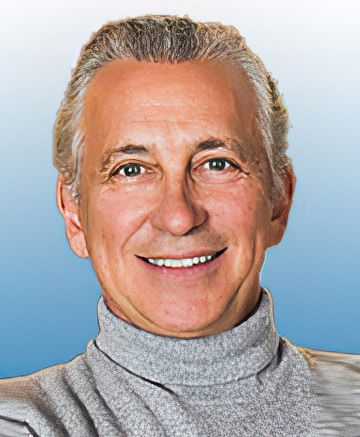
Tony Nader, M.D., Ph.D., M.A.R.R.
Fullness, wholeness, unperturbed peace, unconditional love, unbounded compassion, unfailing fairness, and unwavering perfection seemed to be ideals that did not belong to our normal human lot. Are those ideals only reserved for the afterlife in some heavenly sphere? There are rare individuals who after great trials and tribulations have had fleeting moments or a glimpse of wholeness and bliss. A few, after experiencing a spiritual rapture, spent the rest of their lives in seclusion as recluses seeking divine communion. Some went on to become saints within various religions and belief systems.
And here was someone on a TV show almost normalizing in my eyes the gigantic, rare achievements I had dreamed of but never felt were in my reach. He was not only saying that everyone can experience and live these ideals, but that it was easy, natural, and even the birthright of everyone. A reclusive life was not necessary. I did not have to abandon my beliefs or my devotion to God in the way I knew him. I could still pursue my passion for knowledge, science, and medicine in my desire to live a worthy life and make a difference where I could. No sacrifice, no suffering, no pain was necessary.
I had decided to study medicine to alleviate suffering, but also hoping to uncover through science the secrets of how the human mind and body function to guide people’s behavior.
Maharishi Mahesh Yogi, the speaker I saw on television, was an Indian physicist, who became a monk in the Himalayas under the tutelage of the most revered representative and highest authority on Veda and the Vedic Tradition—the ancient knowledge from where yoga, meditation, Ayurveda, and many other disciplines come… The more I looked at Maharishi, the more I felt intrigued. He spoke about consciousness in ways I never heard before—Pure consciousness, inner deep consciousness, and higher states of consciousness. He said, “Pure consciousness is an infinite reservoir of creativity and intelligence” and “is the ultimate unified level of being, which is the true self of everything and everyone.”
What I knew about consciousness was three major states: sleep, dream, and waking, as well as “altered states” that people have with drugs, injury, or disease. He was certainly not talking about drug-induced hallucinations, self-suggestion, or a hypnotic trance. Maharishi described his method of experiencing and living pure consciousness as a natural, simple, and do-it-yourself mental technique that settles all activity of the mind, giving very deep rest while one remains awake and alert. He said that you transcend all activity of the mind and go deep within your inner self. This is where you experience peace, happiness, and freedom from limitations….
Watch Dr. Nader introduce One Unbounded Ocean of Consciousness (1:17)
Maharishi described his method of experiencing and living pure consciousness as a natural, simple, and do-it-yourself mental technique that settles all activity of the mind, giving very deep rest while one remains awake and alert.
Consciousness is surely central to our life, since all we plan, think, feel, and experience happens in our awareness—our consciousness. I never imagined, however, that without any medicines or drugs, consciousness could be enlivened or transformed, or the development of consciousness itself could improve the human mind, body, and behavior. What was the nature of consciousness, and how could it lead to such results? How was it possible to be conscious without any thoughts?
As a doctoral student at the University of California, Los Angeles (UCLA), Robert Keith Wallace had at the time described in his peer-reviewed published research and in his Ph.D. thesis, a fourth major state of consciousness different from sleep, dream, and waking. This fourth state was characterized by physiological, electro-encephalographic, and mental changes different from those of sleep, dream, and waking. Wallace described it as a state of “restful awareness” or “hypometabolic wakefulness”…
A few months before the TV encounter with Maharishi, I read an article describing the discovery by physicists Weinberg, Glashow, and Salam in 1968 of a level of nature that shows how apparently different forces such as electricity, magnetism, and the force responsible for radioactive decay are, in reality, unified at their basis. The article stated that physicists now suggest that all we observe on the surface level of manifestation seems to come from one unified field. All objects, minerals, organic life, trees, animals, and humans ultimately are made from one unified field of all the laws of nature. Weinberg, Glashow, and Salam won the Nobel prize for their discovery in 1979.
Consciousness is surely central to our life, since all we plan, think, feel, and experience happens in our awareness—our consciousness.
John Hagelin, a Harvard-trained Ph.D. in physics and a researcher at the European Council for Nuclear Research (CERN), where the world’s largest and most powerful particle accelerator is now located, was closely working with Maharishi on the possible connection between pure consciousness and the unified field of all the laws of nature. Hagelin later devoted his career to the exploration of a fully unified theory of nature and the extent to which it corresponds from a physics point of view to pure consciousness….
I measured risk versus benefit and decided to try Maharishi’s Transcendental Meditation, thinking I had nothing to lose except a few dollars and 20 minutes twice a day for a few days, in case it did not work for me. After all, as Maharishi had said, laughing—“The proof of the pudding is in the eating!”
I experienced my mind settling down to a place I had never imagined possible. No thoughts, no images, no fear, no boundaries, no concerns—just pure being, pure deep inner silence, inner peace, but with unrestricted wakefulness, a settled, unbounded awakening. My mind transcended all sensory and mental experience to an absolute state of no change. Yet, it felt real. It was the most abstract sense of pure existence in peace, but as palpable as any sensory experience. Floating in this serenity, all vanished, yet nothing was lacking. The instructor who had taught me this very ancient technique, which he had described as supreme yoga of the mind, Transcendental Meditation, could not hide his delight in hearing my experience, and he commented, “What you experienced was pure consciousness, your true Self with a big ‘S,’ and that Self is the self of everything and everyone.” He laughed and added, “Now you know thy true self!”
I experienced my mind settling down to a place I had never imagined possible. No thoughts, no images, no fear, no boundaries, no concerns—just pure being, pure deep inner silence, inner peace, but with unrestricted wakefulness, a settled, unbounded awakening.
It was such an unexpected experience that I wondered how many others have had it and whether I would ever have it again. On and off, depending on the day and the circumstances, the subjective experience was different, but with every transcendence, more and more stability and happiness grew in my life. Millions of people tried it and, depending on their individual stress level and regularity of practice, had similar experiences. It was not only the depth of experience in meditation that counted, but mainly its benefits in daily life.
Fast-forward 25 years in which I completed my medical and scientific training at Harvard and MIT, spent precious time learning about consciousness under Maharishi’s guidance, and explored the similarities between modern objective scientific findings and the ancient subjective expressions of knowledge available in the Veda and in the teachings of various schools of thought. And I found myself sitting with Maharishi asking me to take the most unexpected responsibility.
He told me: “You will represent me, Guru Dev, and the Vedic tradition to ensure the teaching everywhere, now and in the future, continues in its purity and is made widely available for the benefit of all.”
Over the years I was with Maharishi, he taught me to be simple, keep my mind open, and learn to see with my heart as well as with my eyes. The biggest questions often have simple solutions.
Order One Unbounded Ocean of Consciousness at DrTonyNader.com ►
Watch Dr. Nader introduce his new book (1:17)
© Copyright 2021, Tony Nader, M.D., Ph.D. All rights reserved. Do not reproduce without written permission of the author.
My mind transcended all sensory and mental experience to an absolute state of no change… It was the most abstract sense of pure existence in peace, but as palpable as any sensory experience. Floating in this serenity, all vanished, yet nothing was lacking.
Find Dr. Nader’s talks on his Facebook page ►
For Dr. Nader’s podcasts, find him on iTunes, Spotify, and SoundCloud, as well as Google Play, Cashbox, and all other podcast platforms.

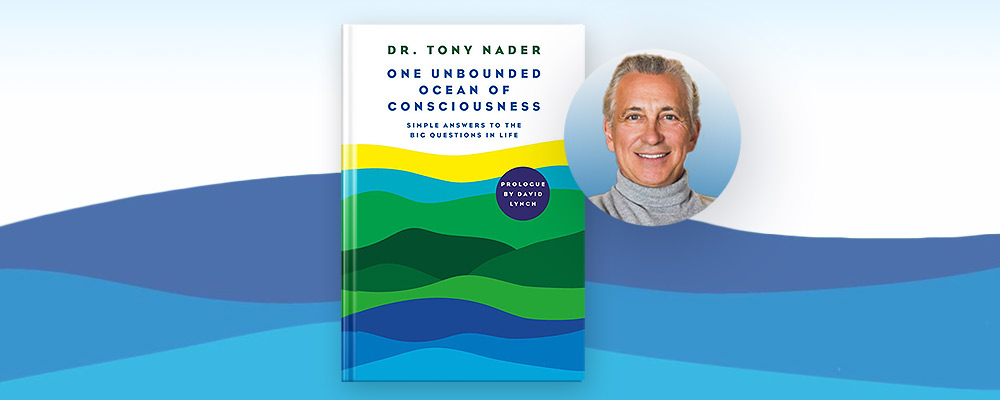
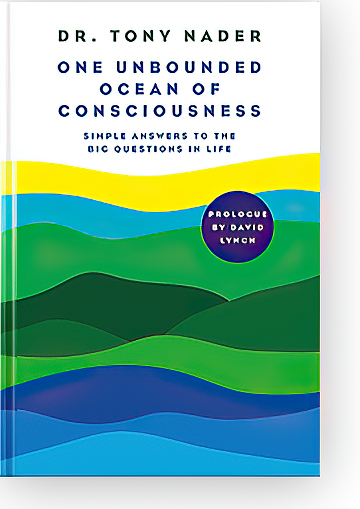
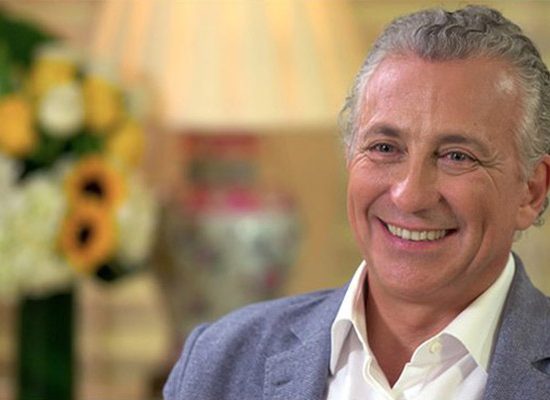
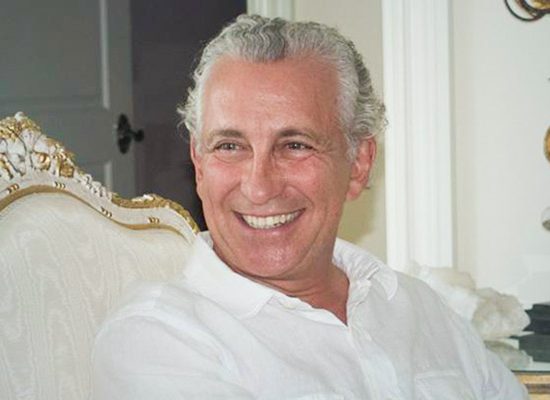
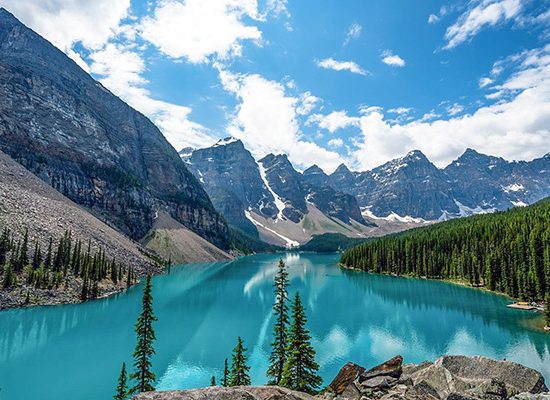
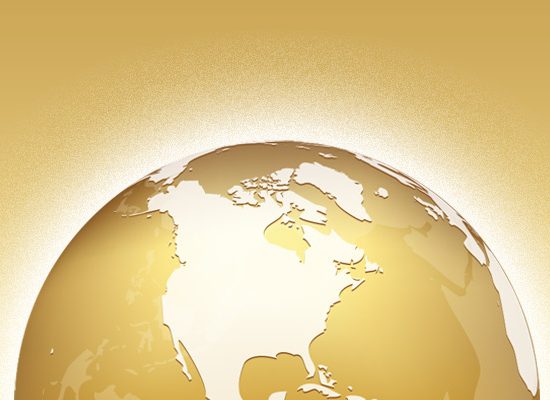
Thank you for your leadership and willingness to share your insights. TM has been a constant friend these 48 years and a vehicle to glimpse so many joys never imagined.
Unfortunately, your narrative above is very broad and a general explanation on the experiences of TM… repeated by many a million times in the U.S. over the past +70 years… nothing new… all heard many time before.
I do not want to read something that only touches ‘the tips of the waves’… the TM experience is a very deep subject.
Hi Scott, you’re so right that the TM experience is a very deep subject! This excerpt is just the very beginning of a profound and comprehensive exploration by Dr. Nader on the science of Consciousness, the Vedic tradition, higher states of consciousness and enlightenment, and questions about the ultimate reality of life. For longer samples, Apple Books has a 50-page excerpt, and we’ll also be reprinting additional excerpts in upcoming issues. Thanks for your comment. I recommend the book for a deep investigation into the TM experience.